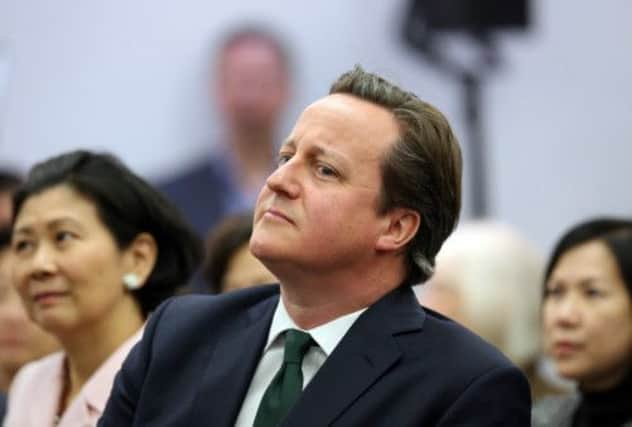Leaders: Europe obsession distracting from real task


“Europe” has again resurfaced as a most contentious issue for the Conservative Party. The immediate focus this time is a proposed amendment to a Commons motion next week expressing regret that the Queen’s Speech contained no reference to a referendum on the UK’s membership of the EU. The Prime Minister’s position is that negotiations should be held and a referendum held on the outcome of these after the general election in 2015. Conservative rebels seek to force a referendum sooner.
For a party that has consistently proclaimed its priority is to cut our billowing budget deficit, repair the economy and restore the country to growth, all this is a huge distraction and a betrayal of the government’s prime mission. Progress, both on reducing the deficit (never mind the total of debt, which continues to rise) and putting in hand recovery, has been glacial. There is thus more reason than ever for the government to concentrate its attention on sorting the economy and for back-benchers to be sharply reminded that this, and not Europe, is the number one priority.
Advertisement
Hide AdAdvertisement
Hide AdLast week’s strong showing for Ukip – in local elections that did not involve Scotland or some other parts of the UK – was fuelled by a number of concerns, not just Europe, and indeed it is questionable whether “Europe” or the demand for the UK’s withdrawal was the most potent. While the latest YouGov poll does show Ukip at 16 per cent biting a big chunk from Conservative support, only 49 per cent of Ukip supporters say Europe was the issue of utmost importance to the country, compared with 73 per cent worried about the economy.
And on the economy, voters have even more reason for a depressing sense of déjà vu. Yesterday, the Bank of England’s monetary policy committee voted to hold interest rates down at 0.5 per cent. This is the 50th consecutive month that it has felt it necessary to keep rates at this record low level. While there have been modest signs of an upturn in latest business confidence surveys, the economy narrowly escaped a return to recession earlier this year. Most economists say the outlook for the rest of 2013 is for extremely muted recovery. In Scotland, the respected Fraser of Allander Institute is forecasting growth of just 0.8 per cent. There have also been worrying signs that the recent strength in the labour market may be faltering, with some 950 job losses announced in Scotland last month and another 335 in prospect.
Conservative back-benchers should play their part in this and put pressure on the government to show, both to voters and to the outside world, that it will not be distracted and that it really is “on the case” to repair the economy.
Law needs help to beat rail vandals
Scotland’s railway infrastructure has had to endure frequent assaults from vandals over the years. But few acts of vandalism are more life-threatening and mindless than hurling stones at trains.
Late on Wednesday evening a driver was taken to hospital after a stone was thrown through the window of his train as it approached Newton station in South Lanarkshire. The window of the cab was broken, leaving the driver covered in shattered glass and with an eye injury.
Such madness on the part of vandals could have had catastrophic consequences with the lives of passengers put in danger through injuries inflicted on the driver leading to the train running out of control.
Sadly, there are too many instances of window smashing and vandalism to Scottish trains, though this incident was one of the most serious. In January the window on a train was damaged by vandals at Inverness station in what police described as a “wanton act of vandalism”. Two years ago, cab window glass was smashed in a ScotRail train by a lit “petrol bomb” thrown from a bridge near Dunning in Perthshire. And in 2001, the guard on a Virgin Trains service suffered an eye injury when a brick shattered a train window at Polmadie, south of Central Station in Glasgow. Transport police clearly need to take firm action to deter such crimes and the courts reminded of the need for punishment that truly deters. But neither of these can be truly effective without the involvement of the public in coming forward as witnesses. That civic duty would be clearly enhanced by greater awareness that this kind of behaviour is grossly irresponsible and puts lives at serious risk.